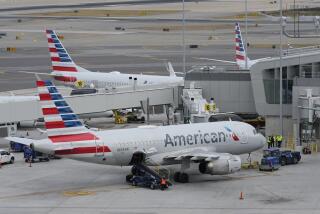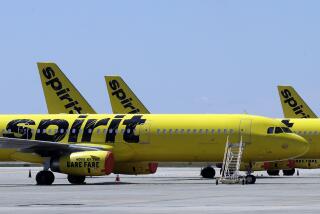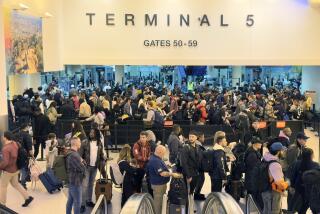Airfare ads soon must include taxes, fees
Fly from Albuquerque to Tucson on Southwest Airlines for $59. Jet from Asheville, N.C., to Orlando, Fla., on Allegiant Air for $49. Fly from Boston to Chicago on Spirit Airlines for only $9.
If these fares seem too good to be true, that’s because they are. An asterisk accompanies the online ads for the fares, signifying that additional fees and taxes apply. In some cases the additional charges raise the ticket price 20% or more.
Starting Jan. 26, no more asterisks. A new U.S. Transportation Department rule requires that from then on, all advertised airfares include the non-optional fees and taxes, including fuel charges and the Sept. 11 Security Fee.
“The price advertising provision was adopted to make sure passengers know the full amount they will have to pay for air transportation when they buy a ticket,” agency spokesman Bill Mosley said.
The federal regulation does not require that airfares include optional baggage fees or charges for food and onboard entertainment.
Southwest Airlines, Spirit Airlines and Allegiant Air are fighting the rule in a legal challenge filed in November with the U.S. Court of Appeals for the District of Columbia. The airlines are claiming that the federal agency has no proof that advertising base fares separately from fees and taxes is “unfair or deceptive conduct,” according to court documents.
The airlines also described the rule as “arbitrary and capricious,” saying the practice of advertising fees and taxes separately has been used for years by “virtually every other industry in the United States.”
Despite the legal challenge, Mosley said his agency plans to start enforcing the rule Jan. 26.
Southwest and Allegiant representatives plan to abide by the rule while they pursue the legal challenge. A spokeswoman for Spirit Airlines declined to comment.
• Hotel guests want help staying fit, survey says
Business travelers try to eat right and exercise while on the road, according to a survey about their habits, but they want a little help from their hotels to keep them on the right track.
Of the travelers surveyed by KRC Research on behalf of Texas-based Omni Hotels & Resorts, 56% said they indulge in food and drinks when traveling and regret it.
Also, 56% said they would like more low-fat options on the hotel restaurant menu. When it comes to in-room refreshments, 73% said they want healthful snacks and 70% said they want bottled water available.
Nearly one-third said they usually pack workout gear but never have time or energy to exercise.
Omni, which has hotels in Los Angeles and San Diego, offers an option for guests who want to exercise in their own rooms. For a $15 fee, the hotel will furnish the guest’s room with a treadmill, two-pound dumbbells, an exercise mat, stretch cords, a bottle of water and a mini radio headset.
The survey was of 200 men and women who travel for business at least six times a year and spend $150 or more a night for hotel accommodations.
• American Airlines warns of scam emails
If you get a suspicious email that appears to be from American Airlines, it could be part of a scam to pilfer personal information.
The airline suspects that hackers have sent out, as recently as November, what are known as “phishing” emails intended to mislead people into giving up information such as their passwords to the airline’s reward program.
To warn customers, American Airlines has posted several examples of the phony emails on its website.
One such email says the recipient has paid $278 for a flight to New York and should download the ticket. Another offers the recipient $50 to take a five-question survey.
The airline warned anyone who gets the bogus emails not to click on any links, open any attachments or call the listed phone numbers. Instead, the airline asks recipients to forward the emails to webmaster@aa.com.
“We are aware of the scam,” spokesman Ed Martelle said. “It is being investigated by our corporate security department so we can find a way to shut it down.”






